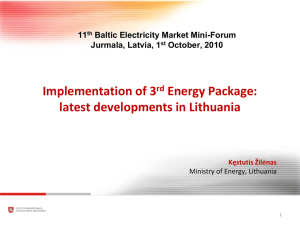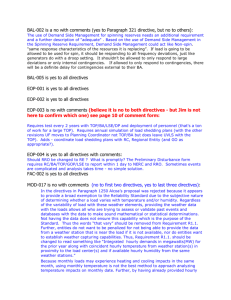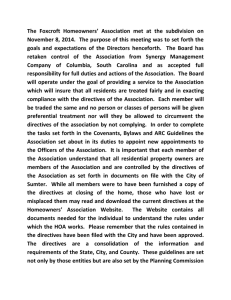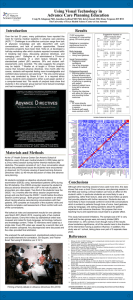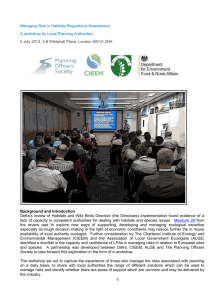Contribution to the REFIT process for the EU Birds and Habitats
advertisement
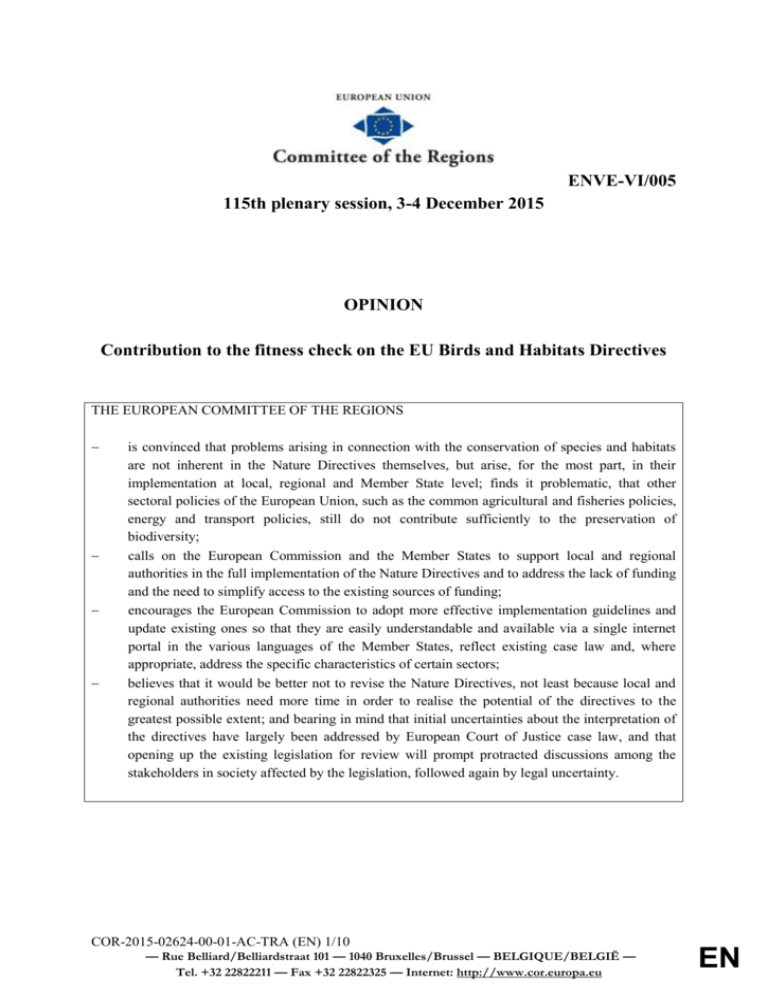
ENVE-VI/005 115th plenary session, 3-4 December 2015 OPINION Contribution to the fitness check on the EU Birds and Habitats Directives THE EUROPEAN COMMITTEE OF THE REGIONS is convinced that problems arising in connection with the conservation of species and habitats are not inherent in the Nature Directives themselves, but arise, for the most part, in their implementation at local, regional and Member State level; finds it problematic, that other sectoral policies of the European Union, such as the common agricultural and fisheries policies, energy and transport policies, still do not contribute sufficiently to the preservation of biodiversity; calls on the European Commission and the Member States to support local and regional authorities in the full implementation of the Nature Directives and to address the lack of funding and the need to simplify access to the existing sources of funding; encourages the European Commission to adopt more effective implementation guidelines and update existing ones so that they are easily understandable and available via a single internet portal in the various languages of the Member States, reflect existing case law and, where appropriate, address the specific characteristics of certain sectors; believes that it would be better not to revise the Nature Directives, not least because local and regional authorities need more time in order to realise the potential of the directives to the greatest possible extent; and bearing in mind that initial uncertainties about the interpretation of the directives have largely been addressed by European Court of Justice case law, and that opening up the existing legislation for review will prompt protracted discussions among the stakeholders in society affected by the legislation, followed again by legal uncertainty. COR-2015-02624-00-01-AC-TRA (EN) 1/10 — Rue Belliard/Belliardstraat 101 — 1040 Bruxelles/Brussel — BELGIQUE/BELGIË — Tel. +32 22822211 — Fax +32 22822325 — Internet: http://www.cor.europa.eu EN Rapporteur Roby Biwer (PES/LU) Member of Bettembourg Municipal Council, Luxembourg COR-2015-02624-00-01-AC-TRA (EN) 2/10 Opinion of the European Committee of the Regions – Contribution to the fitness check of the Birds and Habitats Directives I. POLICY RECOMMENDATIONS THE EUROPEAN COMMITTEE OF THE REGIONS General comments 1. highlights the fact that halting the loss of biodiversity and natural habitats and the degradation of ecosystem services by 2020 and restoring them to their former state is one of the biggest environmental challenges we face at this time; 2. notes that the relevant recitals of the EU Directive on the conservation of wild birds1 and the EU Directive on the conservation of natural habitats and of wild fauna and flora 2 (the "Nature Directives") stipulate among other things that the conservation, protection and improvement of the quality of the environment are essential objectives of general interest pursued by the Community and that the decline in the number of wild species and their habitats constitutes a grave threat to the conservation of the natural environment; 3. expresses concern that, according to recent studies, such as the report on The State of Nature in the European Union 3 , the biodiversity target for the year 2020 endorsed by the European Council on 25-26 March 2010 is unlikely to be achieved if this relies only on the measures taken or planned so far; 4. shares the assumption made by the European Commission in the European Biodiversity Strategy4 that full implementation of the Nature Directives is essential to prevent further loss of biodiversity and to achieve the Strategy's objectives; 5. points out that local and regional authorities have a key role to play in the implementation of the Nature Directives and is convinced that, because of this key role, the European Committee of the Regions has special expertise relevant to the Nature Directives; 6. would therefore like to contribute the special expertise it has on the Nature Directives by virtue of its political mandate to the European Commission's ongoing fitness check5 and adopts the following positions on the various issues raised by the European Commission; 1 Directive 2009/147/EC, OJ L 20, 26.1.2010, p. 7. 2 Directive 92/43/EEC, OJ L 206, 22.7.1992, p. 7. 3 4 5 COM(2015) 219 final. COM(2011) 244 final. See the mandate of the European Commission: http://ec.europa.eu/environment/nature/legislation/fitness_check/docs/Mandate%20for%20Nature%20Legislation.pdf. COR-2015-02624-00-01-AC-TRA (EN) 3/10 Relevance 7. takes the view that the reasons and objectives that led to the adoption of the Nature Directives remain valid today and that the Nature Directives are essential for the protection of species and their habitats and the types of habitat present in the European Union; 8. emphasises that the Nature Directives address all the main threats to the species, their habitats and habitat types in the European Union; 9. is extremely concerned that the provisions of the Nature Directives have not yet been implemented fully by all Member States; points out that Natura 2000 sites sometimes lack legal status, that there is often no management plan and that specific safeguards are often missing, and calls for closer involvement of local and regional authorities in these tasks; 10. points out that the Nature Directives seek to offer comprehensive protection in all policy areas to the species, habitats and habitat types most in need of protection; also points out that, consequently, the challenge for the future is to incorporate nature conservation into other policy areas, such as agricultural policy, which is not yet happening in an optimal way; 11. considers, in this context, the Nature Directives to be extremely relevant for the protection of species, their habitats and habitat types from pressures and threats at local and regional level, including the loss and fragmentation of habitats, pollution and the spread of non-native animal and plant species; Effectiveness 12. acknowledges that the state of species, their habitats and habitat types has improved markedly in the areas where the Nature Directives have been implemented6 and therefore considers that the objectives of these directives can be achieved if they are implemented fully; 13. emphasises that a wide range of practical examples in the report on The State of Nature in the European Union show that Member States and local and regional authorities have a key role to play in the protection of species and habitats; 14. expresses its grave concern that successes in the conservation of species and habitats resulting from the implementation of the Nature Directives are limited in scope and incomplete, since the great majority of species and habitat types still have an unfavourable conservation status and a significant proportion may even experience further deterioration; 15. also points out that biodiversity in areas outside those protected by the Nature Directives has not developed as well as in the Natura 2000 sites, as shown by the dramatic decline in common bird species; 6 See COM(2015) 219 final. COR-2015-02624-00-01-AC-TRA (EN) 4/10 16. is convinced that debates between different types of stakeholders related to a few species having the potential to cause damage, can be solved through clear instructions in management plans that lay down a series of interventions and are given appropriate support, in terms of finances and staff, to guarantee public health and public safety and to avoid serious damage and compensate for those that are unavoidable; 17. calls on the European Commission and the Member States to support local and regional authorities in the full implementation of the Nature Directives; notes that this is particularly important with respect to the designation and the legal protection of Natura 2000 sites and the formulation of specific conservation objectives with respect to protecting species and habitats through conservation and restoration measures and with respect to the necessary financial support, not least to address the lack of funding and the need to simplify access to the existing sources of funding7; 18. encourages the European Commission to adopt more effective implementation guidelines and update existing ones so that they are easily understandable and available – via a single internet portal8 – in the various languages of the Member States, reflect existing case law and, where appropriate, address the specific characteristics of certain sectors; 19. calls on the Commission to place greater emphasis on information, education and awarenessraising, especially about the usefulness of nature conservation measures and Natura 2000 sites, and to develop, for example, the existing Natura 2000 viewer of the European Environment Agency into a comprehensive geographical online information system which systematically informs the public, planners, land users and other stakeholders about all aspects of the implementation of the Nature Directives in individual Natura 2000 sites; 20. therefore believes that the shortcomings that have been identified and the worrying conservation status of many species and habitat types cannot be attributed to a lack of effectiveness of the Nature Directives, but that these have, on the contrary, proven to be very effective instruments for the protection of biodiversity; Efficiency 21. points out first of all that it is primarily society's task to preserve biodiversity, by adopting a sustainable and durable way of life and an economic model that can be followed globally; 22. highlights the fact that in a public consultation undertaken by the European Commission9, small and medium-sized enterprises did not list the Nature Directives among the ten financially most onerous legal provisions; 7 8 9 See CDR 112/2010 final and CDR 8074/2013. See CoR TIA Report 2015. See http://europa.eu/rapid/press-release_IP-13-188_en.htm. COR-2015-02624-00-01-AC-TRA (EN) 5/10 23. regrets that planners, land users and other key sectors have incurred costs, sometimes unnecessarily, through the late or incomplete designation of Natura 2000 sites; points out, at the same time, that different costs for different local and regional authorities are the result of the sometimes uneven distribution across regions of species and habitat types and the nature protection measures needed in consequence; 24. emphasises that many of the Natura 2000 sites give rise to important revenue-producing ecosystem services at local and regional level10, for example in the form of healthcare services, CO2 storage, flood retention, purification of water reserves, air purification, or prevention of soil erosion; 25. points out that current research11 confirms that there is an excellent cost/benefit ratio at local and regional level, since the environmental, social and economic gains far outweigh the costs of implementing the Nature Directives; 26. notes the opportunities provided by the Natura 2000 network in terms of generating jobs and income in the sectors of environmentally sound tourism and nature recreation. Highlights the special importance of creating new business opportunities in disadvantaged rural areas in this regard; 27. considers, therefore, that whereas the implementation of the Nature Directives naturally gives rise to costs, these costs are necessary to protect biodiversity – including with a view to sustainability – and are proportionate to the much larger benefits these directives yield, which can only partially be measured in monetary terms; Coherence 28. is convinced that the two Nature Directives, taken separately, furnish excellent examples of legislation that is concise, comprehensible, consistent, systematic and, as such, overall well targeted; 29. considers that, taken together, the two Nature Directives are successful tools of legislation, since both operate in a similar manner, are not mutually contradictory and complement each other sensibly as regards measures of protection so as to create, jointly, the system of safeguards known as Natura 2000; 30. assumes that the Nature Directives are compatible with other EU environmental legislation and notes in this context the EIA Directive, which was amended explicitly for that purpose12; at the same time, encourages the Member States as well as local and regional authorities to better 10 11 12 Brink/Badura/Bassi/et al., Estimating the Overall Economic Value of the Benefits provided by the Natura 2000 Network, 2011. EU reports show that fully establishing all Natura 2000 sites would cost the Member States around EUR 6 billion a year. By contrast, Natura 2000 sites generate ecosystem services valued at up to EUR 300 billion and, moreover, have the potential to create up to eight million jobs. Directive 2014/52/EU, OJ L 124, 15.4.2010. COR-2015-02624-00-01-AC-TRA (EN) 6/10 coordinate the implementation of different pieces of environmental legislation and, for example, to move ahead with the integration of licensing procedures, monitoring measures and reporting requirements; 31. takes the view that it could be useful, both for reasons of environmental protection and to avoid unnecessary costs, to improve the coordination of planning processes laid down in the Nature Directives, the Water Framework Directive 13 and, as appropriate, the EIA and SEA Directives14; 32. calls on the Member States to work with local and regional authorities and help them with the practical implementation of legislation, such as the EU Regulation on Invasive Alien Species15; 33. finds it problematic, irrespective of the good integration of the Nature Directives into EU environmental law, and with a view to achieving the objectives of the Nature Directives, that other sectoral policies of the European Union, such as the common agricultural policy, the common fisheries policy or energy and transport policies, still do not contribute sufficiently to the preservation of biodiversity16; 34. thinks an obligation will have to be included in the European Commission's mid-term report on the European Structural and Investment Funds requiring all projects funded by the EU to undergo a biodiversity check17; 35. also calls on the European Commission to propose a legislative framework, as part of the European Biodiversity Strategy, to conserve species and habitats outside Natura 2000 sites, as well as species that are not subject to strict protection measures, in order to prevent net losses of biodiversity and ecosystem services18; 36. is convinced, in view of the above, that the Nature Directives are well suited to achieving their stated goals, but that more needs to be done to stop behaviour that harms biodiversity in other policy areas not covered by the Nature Directives; EU added value 37. recognises that the Nature Directives have contributed significantly to a more uniform and effective approach to the conservation of nature and species and to raising minimum standards in this area of law in the regions of the various Member States; 13 Directive 2000/60/EC, OJ L 327, 22.12.2000, p. 1. 14 15 16 17 18 Directive 2001/42/EC, OJ L 197, 21.7.2001, p. 30. Regulation (EU) No 1143/2014, OJ L 317, 20.3.2014, p. 35. See CoR 112/2010 final; CoR 22/2009 final; as well as CoR TIA Report 2015 (conflicts with regional policy). See CdR 4577/2013 final. See CdR 4577/2013 final and EP Resolution 2011/2307 (INI). COR-2015-02624-00-01-AC-TRA (EN) 7/10 38. notes that biodiversity and habitat diversity are unevenly distributed across Europe, including across borders, and that there is a corresponding need for an EU-wide approach that coordinates Member States' efforts to ensure effective protection across the borders of the Member States; 39. recalls that the Nature Directives constitute the key instrument enabling the European Union to respect its international commitments under the Convention on Biological Diversity (CBD) and other international agreements, such as the Convention on the Conservation of European Wildlife and Natural Habitats (Bern Convention) and the Bonn Convention on the Conservation of Migratory Species (CMS) and thereby also to influence biodiversity and wildlife inside and outside the European Union in a positive way; 40. is convinced that the Nature Directives have contributed significantly way to the introduction of uniform protection standards in the Member States, which have provided businesses with guarantees that a clear framework with equal conditions of competition exists across the European single market; 41. in the light of the above, emphasises that common legislation at European Union level is needed more than ever to meet the objectives of the EU Biodiversity Strategy and the international conventions and that the Nature Directives constitute an excellent basis for this purpose; Final remarks 42. is convinced that any problems arising in connection with the conservation of species and habitats are not inherent in the Nature Directives themselves, but arise, for the most part, in their implementation at local, regional and Member State level; 43. believes, for the above reasons, that it would be better not to open up the Nature Directives for review, also bearing in mind that initial uncertainties about the interpretation of the directives have largely been addressed by European Court of Justice case law; 44. believes, further, that it would be better not to revise the Nature Directives, not least because local and regional authorities need more time to implement measures that are possible and foreseen under the directives but have not yet been put in place, such as management plans still missing so far, in order to realise the potential of the directives to the greatest possible extent; 45. is very concerned, bearing in mind not least the interests of the different groups applying the Nature Directives, that opening up the existing legislation for review will prompt protracted discussions among the stakeholders in society affected by the legislation, followed by decades of legal uncertainty; 46. is concerned about the destruction of individual Natura 2000 sites and the current level of illegal killing and trapping of birds and other species and is convinced that a greater effort at all governance levels is needed to meet the requirements to monitor and enforce the Nature Directives; COR-2015-02624-00-01-AC-TRA (EN) 8/10 47. therefore considers that the European Commission must take its role as guardian of Union law seriously and calls on it to respond seriously to complaints concerning the application of Union law and to initiate infringement proceedings as appropriate; 48. recommends that the European Commission use the fitness check procedure to emphasise the importance of better implementation of the Nature Directives by the Member States and welcomes the approach taken by the latter to involve local and regional authorities in the implementation. Brussels, 4 December 2015 The President of the European Committee of the Regions Markku Markkula The Secretary-General of the European Committee of the Regions Jiří Buriánek COR-2015-02624-00-01-AC-TRA (EN) 9/10 II. PROCEDURE Contribution to the fitness check of the Birds and Habitats Directives Own-initiative opinion Reference Article 307(4) TFEU Legal basis Rule 41(b)(ii) of the Rules of Procedure Procedural basis Date of Council/EP referral/Date of Commission letter 2 June 2015 Date of Bureau decision Commission for the Environment, Climate Change and Commission responsible Energy (ENVE) Roby Biwer (PES/LU) Rapporteur Member of Bettembourg Municipal Council 13 July 2015 Analysis 28 September 2015 Discussed in commission 28 September 2015 Date adopted by commission unanimous Result of the vote in commission 4 December 2015 Date of adoption in plenary Opinion Multilevel governance in promoting the EU Previous Committee opinions Biodiversity Strategy to 2020 and implementing the international Aichi Targets, COR-2013-08074-00-00AC19 Opinion on Green Infrastructure – Enhancing Europe's Natural Capital, CDR4577-2013_00_00_TRA_AC20 Opinion on an EU and international biodiversity policy beyond 2010, CDR112-2010_FIN_AC21 Opinion on A new impetus for halting biodiversity loss, CDR22-2009_FIN_AC22 Date of subsidiarity monitoring Territorial Impact Assessment, July 2015 consultation Title _____________ 19 20 21 22 OJ C 271, 19.8.2014, p. 45. OJ C 356, 5.12.2013, p. 43. OJ C 267, 1.10.2010, p. 33. OJ C 211, 4.9.2009, p. 47. COR-2015-02624-00-01-AC-TRA (EN) 10/10


